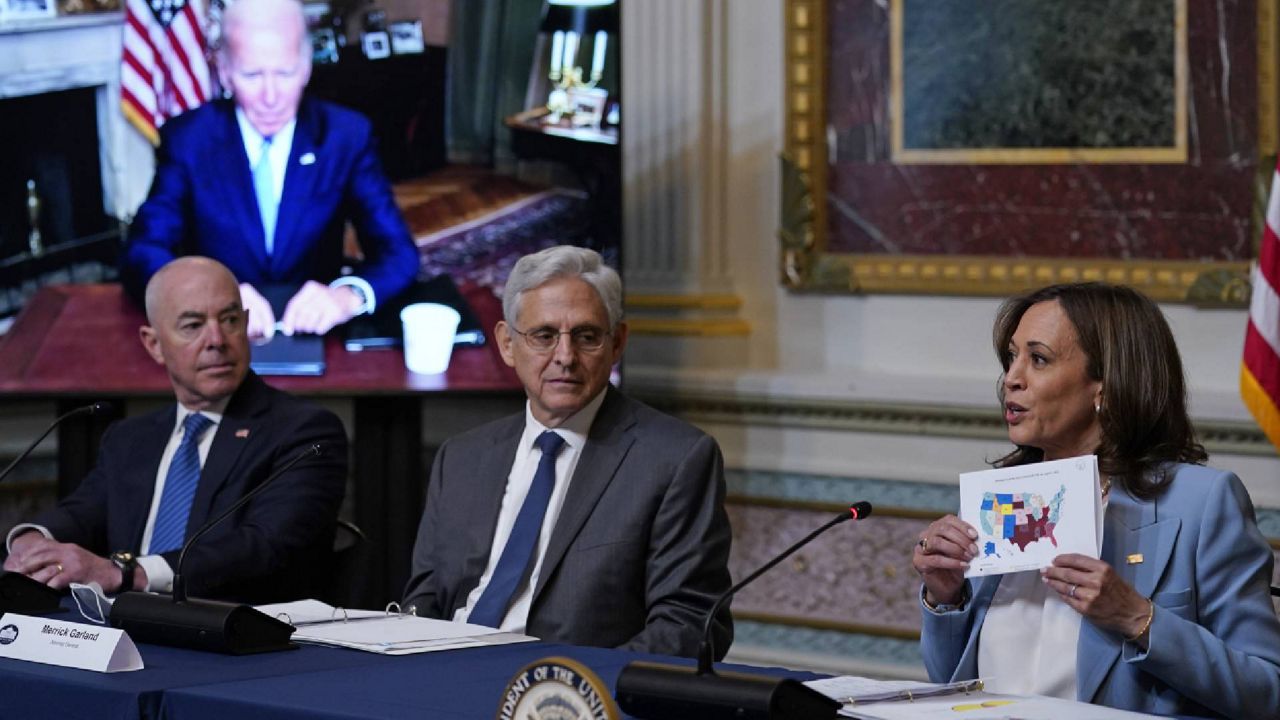President Joe Biden on Wednesday signed a second executive order aimed at protecting access to abortion rights, the latest action taken by his administration after the Supreme Court voted to overturn Roe v. Wade earlier this summer.
Biden signed the order while isolating with a rebound case of COVID-19, appearing on a TV screen at the first meeting of a new federal task force on reproductive health care access. Vice President Kamala Harris led the meeting in person at the White House Wednesday.
"I believe Roe got it right," Biden said Wednesday, calling the court's decision to overturn the landmark ruling a "health care crisis."
"It has been the law for close to 50 years. And I committed to the American people that we're doing everything in our power to safeguard access to health care, including the right to choose that woman had under Roe v. Wade, which was ripped away by this extreme court."
The order is partly meant to make it easier for women traveling between states to obtain access to the procedure, according to the White House.
One of the directives of the order could allow states that have not banned abortion to apply for Medicaid waivers that would help doctors treat women who traveled from out of state for the procedure.
Vice President Harris on Wednesday spoke about her recent travel around the country to meet with state legislators and reproductive rights groups on the issue, saying that "the women of America should not be the subject of partisan debate."
"We trust the judgment of the women of America to make decisions based on what they know is in their best interest," she said. "We understand fully the government should not be making that decision for her."
Harris serves on the newly-created interagency Task Force on Reproductive Healthcare Access, which is chaired by Health and Human Services Secretary Xavier Becerra and White House Gender Policy Council Director Jennifer Klein.
Becerra and HHS officials have already taken steps to clarify laws surrounding women's rights to medication abortion and to emergency care if a pregnancy puts a woman's health at risk, both actions directed by the president's first executive order.
"Providers may not delay care until a woman is in a life-threatening condition," Becerra said Wednesday. "We know that delayed care can threaten lives, impair essential bodily functions and even compromise a woman's ability in the future to carry a healthy pregnancy to term."
The second order Biden signed Wednesday also calls on federal health officials to require health care providers to comply with federal nondiscrimination laws to give women medically necessary care without delay.
"Under federal law, no woman, whether pregnant or not, no matter where she lives, should be turned away or denied necessary treatment during the medical crisis," the president said.
Plus, the order will streamline the collection of key data and information on maternal health at the National Institutes of Health and the Centers for Disease Control and Prevention.
The executive action is Biden's second since the Supreme Court in June overturned Roe v. Wade, the landmark 1973 decision that granted the constitutional right to an abortion nationwide.
The order comes one day after voters in Kansas overwhelmingly rejected a ballot initiative that would have allowed the state's Republican-controlled legislature to restrict or ban the procedure.
It also comes a day after Attorney General Merrick Garland announced that the Justice Department is suing Idaho over its abortion ban, the first legal action the federal government has taken against a state for restricting access to the procedure since the Supreme Court turned the issue back to state governments.
Garland said the federal government was bringing the lawsuit, which seeks to invalidate the state’s “criminal prohibition on providing abortions as applied to women suffering medical emergencies.”
“Idaho’s law would make it a criminal offense for doctors to provide the emergency medical treatment that federal law requires,” Garland said in announcing the suit on Tuesday. "The Justice Department is going to use every tool we have to ensure reproductive freedom.”
Biden has vowed to use the full force of the federal government to fight for a woman's right to choose, but he has admitted that his power to do so is limited without Congress passing a law to solidify national reproductive rights.
"Ultimately, Congress must codify the protections of Roe as federal law," he said Wednesday. "And if Congress fails to act, the people of this country need to elect senators and representatives who will restore Roe and will protect the right to privacy, freedom and equality."
The Associated Press contributed to this report.



